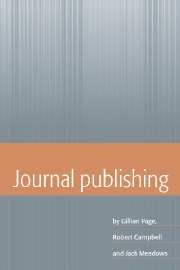Book contents
- Frontmatter
- Contents
- List of figures
- List of tables
- Preface
- 1 Introduction to journals
- 2 Editing
- 3 Production
- 4 Marketing
- 5 Subscription management and distribution
- 6 Non-subscription revenue
- 7 Legal and ethical aspects
- 8 Financial aspects
- 9 Bibliographic aspects
- 10 Managing a list of journals
- 11 Electronic publishing
- Appendix 1 Getting tenders for journals
- Appendix 2 Publishers' and editors' associations
- Glossary
- Bibliography
- Index
Appendix 1 - Getting tenders for journals
Published online by Cambridge University Press: 23 October 2009
- Frontmatter
- Contents
- List of figures
- List of tables
- Preface
- 1 Introduction to journals
- 2 Editing
- 3 Production
- 4 Marketing
- 5 Subscription management and distribution
- 6 Non-subscription revenue
- 7 Legal and ethical aspects
- 8 Financial aspects
- 9 Bibliographic aspects
- 10 Managing a list of journals
- 11 Electronic publishing
- Appendix 1 Getting tenders for journals
- Appendix 2 Publishers' and editors' associations
- Glossary
- Bibliography
- Index
Summary
An editor, a society or some other body seeking a publisher for a journal may be well advised to ask a number of publishers to tender. The sponsor must define the publishing services that the journal needs; for an established journal that should be part of an overall revaluation of the journal and its place in the market. Before any publishers are approached, consideration should be given to any changes that might be desirable. Several publishers can be approached at the same time, and their responses may incorporate suggestions for other improvements in the journal or the way in which it is marketed. Knowledge that other publishers are being approached makes it likely that the bids will be competitive, though some publishers claim they are reluctant to tender in case their ideas are fed back to their rivals.
The sponsor should allow plenty of time for the tendering process and then for the eventual publication of the first issue under the new arrangements. Eighteen months to two years before the first issue is scheduled may not be too long. If the journal is a new one, then the longer period will be helpful since it takes time to gather papers for the first few issues. Often the sponsor is an academic body without full-time staff. It can be difficult to get people together for visits to publishers. If decisions are normally dependent upon council meetings held at fairly long intervals it may be desirable to set up a smaller group (a publications committee perhaps) which can act on its own initiative.
- Type
- Chapter
- Information
- Journal Publishing , pp. 372 - 380Publisher: Cambridge University PressPrint publication year: 1997



